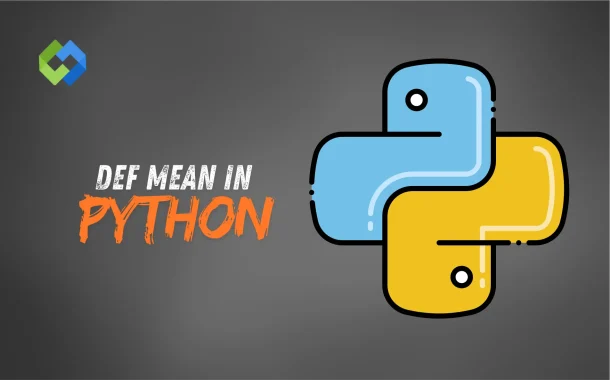When you write a function with def, you decide its name and what it does. After defining it, you can call the function whenever needed. This reduces repetition and keeps your code efficient. For example, you can use a function to calculate numbers or display messages. Learning to use the def keyword is important because it allows you to write better Python programs.
Table of Contents
Table of Contents
Purpose of def
The def keyword in Python serves the purpose of defining functions. Functions are reusable blocks of code designed to perform specific tasks. They allow programmers to break down complex problems into smaller, manageable parts, making the code more organized and easier to work with. By using def, you can name a function, specify its parameters, and define its actions.
One key purpose of def is to promote code reusability. Instead of writing the same code multiple times, you can define a function once and call it whenever needed. This not only saves time but also reduces errors, as any changes to the function automatically apply wherever it is used. Reusable functions make your programs more efficient and maintainable.
The def keyword also enhances readability. By grouping related operations into a function, you make your code easier to understand. Readers can quickly grasp the function’s purpose by its name and structure. This helps in debugging and collaborating with others on the same project.
Creating Functions with def
Creating functions with the def keyword in Python is simple and essential for organizing your code. A function begins with the def keyword, followed by the function name, parentheses for optional parameters, and a colon. Inside the function, you write the tasks it performs using an indented block of code.
For example, to create a function that adds two numbers, you can write.
def add_numbers(a, b):
return a + b
You can then call the function using its name, like add_numbers(3, 5), which will return 8. This approach helps you avoid rewriting the same logic repeatedly.
Functions can also be written without parameters if they perform tasks that don’t need external input. For instance, a simple greeting function:
def greet():
print(“Hello!”)
Learning to create functions with def is crucial for writing efficient and reusable Python programs.
Features of Python Functions
Python functions come with several powerful features that make programming easier and more efficient. These features help you structure your code, pass information, and return results, ensuring flexibility and reusability in your programs.
- Parameters and Arguments: Functions can accept inputs called parameters, allowing you to pass data into the function. For example, a function to calculate the square of a number can take the number as a parameter. You can also provide default values for parameters to make them optional.
- Return Values: Functions can send results back using the return keyword. This allows the output of one function to be used in another part of the program, enabling dynamic and connected operations.
- Scope and Modularity: Functions create their own scope, which means variables inside a function don’t interfere with variables outside. This helps in maintaining clean and error-free code.
- Reusable and Nested Functions: Python functions can be reused multiple times. Additionally, you can define functions inside other functions (nested functions) for specialized tasks. These features make Python functions versatile tools for efficient coding.
Advanced Uses of def in Python
The def keyword in Python is not limited to creating simple functions; it also enables advanced programming techniques. These advanced uses help handle complex tasks, improve efficiency, and add flexibility to your code.
- Nested Functions: You can define functions within other functions using def. Nested functions are useful for creating helper functions that are only relevant within the enclosing function. They help keep your code organized and encapsulated, avoiding conflicts with global functions.
- Closures: Python allows nested functions to capture and remember the variables of the enclosing function, even after the outer function has finished executing. This feature, called closures, is particularly useful for creating specialized functions or callbacks that retain specific data.
- Decorators: Using def, you can create decorators, which are functions designed to modify the behavior of other functions. Decorators are commonly used for logging, access control, or enhancing functionality without altering the original code.
- Dynamic Function Creation: With def, you can define functions dynamically at runtime. This is helpful in situations where the function logic depends on runtime conditions, enabling greater adaptability in your programs.
Common Errors with def
Using the def keyword to create functions in Python is straightforward, but there are common errors that can occur.
Syntax Errors
Syntax mistakes often happen when defining a function, such as forgetting the colon (:) at the end of the def line. For example, def my_function() without a colon will throw an error. Similarly, improper indentation of the function’s body is a frequent issue since Python relies heavily on indentation to define blocks of code.
Incorrect Function Calls
A common mistake when calling a function is forgetting to include parentheses, like writing my_function instead of my_function(). Without parentheses, Python doesn’t execute the function but instead treats it as a reference to the function object. This often leads to unexpected results or errors when trying to use the function.
Parameter Mismatche
Functions with parameters can lead to errors if the number of arguments provided during the call doesn’t match the number expected. For instance, calling a function that requires two arguments with only one will raise a TypeError. This error also occurs if you pass arguments in the wrong order, especially in functions with multiple parameters.
Name Conflicts
Using the same name for a function and a variable in your program can overwrite the function, causing issues when trying to call it later. For example, defining a function named calculate and then assigning calculate = 5 will replace the function with the value 5, leading to errors when calling calculate().
Conclusion
The def keyword in Python is essential for creating functions. Functions help organize code, improve readability, and allow you to reuse logic throughout your program. With def, you can define a function that performs specific tasks, making your code cleaner and more efficient.
Understanding how to use def is key to becoming proficient in Python. It helps you break down complex problems into simpler, manageable pieces. Whether you’re working with basic functions or more advanced concepts like closures and decorators, def is a fundamental tool in Python programming.














